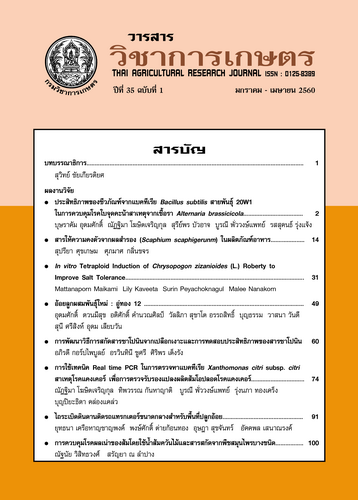การพัฒนาวิธีการสกัดสารซาโปนินจากเปลือกเงาะและการทดสอบประสิทธิภาพ ของสารซาโปนิน
DOI:
https://doi.org/10.14456/thaidoa-agres.2017.18คำสำคัญ:
วิธีการสกัดหยาบ , สารสกัดหยาบซา, โปนิน, ควบคุมศัตรูพืช , หอยเชอรี่ , เชื้อราโรคพืชบทคัดย่อ
การวิจัยนี้ มีวัตถุประสงค์เพื่อหาวิธีการสกัดสารซาโปนินที่มีอยู่ในเปลือกเงาะ วิเคราะห์ชนิด และปริมาณของซาโปนินที่สกัดได้ และการทดสอบประสิทธิภาพของสารซาโปนินในการควบคุมศัตรูพืช ดำเนินการที่ศูนย์วิจัยพืชสวนจันทบุรี ระหว่างเดือนกันยายน พ.ศ. 2554 – ตุลาคม พ.ศ. 2557 ทดลองวิธีการสกัดแบบแช่และแบบกลั่น reflux โดยใช้ตัวทำละลาย3 ชนิด ได้แก่ เอธานอล 70% เมทานอล 70%และน้ำกลั่น พบว่า การสกัดแบบกลั่น reflux โดยใช้ เอธานอล 70% และเมทานอล 70%มีน้ำหนักแห้งของสารสกัดหยาบสูง 44% และ 33% ใช้ระยะเวลาเพียง 9 ชม. การวิเคราะห์
สารสกัดด้วย FTIR พบว่า สารที่ได้คือ ไตรเทอร์พีน และสเตียรอยด์ซาโปนิน เมื่อนำไปวิเคราะห์ปริมาณซาโปนินโดยใช้เครื่องสเปคโตร โฟโตมิเตอร์ พบว่า สารซาโปนิน ที่ได้จากการสกัดแบบกลั่น reflux ด้วยเมทานอล 70% มีปริมาณสูงที่สุด (422.05 มก/ก.) สูงกว่าวิธีการสกัดแบบกลั่น reflux ด้วยน้ำกลั่น และเอธานอล 70% ถึง 23 % และ 14% การทดสอบประสิทธิภาพของสารซาโปนินในการควบคุมศัตรูพืช พบว่า การใช้สารสกัดหยาบซาโปนินที่ระเหยตัวทำละลายออกหมดแล้วผสมกับน้ำกลั่น ที่ความเข้มข้น 2,000 และ 4,000 มก./ล. ทำให้หอยเชอรี่ (Pomacea canaliculata) ตายภายใน 12 ชม. และที่ระดับ ความเข้มข้น 2,000 มก./ล. สามารถยับยั้งการเจริญของโคโลนีเชื้อรา Phytophthora palmivora,Colletotrichum spp. และ Marasmius
palmivorus Sharples. บนอาหารเลี้ยงเชื้อPDA ที่ผสมสารสกัดหยาบซาโปนินได้ดี เมื่อเปรียบเทียบกับกรรมวิธีควบคุม
ดาวน์โหลด
เผยแพร่แล้ว
รูปแบบการอ้างอิง
ฉบับ
ประเภทบทความ
สัญญาอนุญาต
ลิขสิทธิ์ (c) 2017 วารสารวิชาการเกษตร (Thai Agricultural Research Journal)

อนุญาตภายใต้เงื่อนไข Creative Commons Attribution-NonCommercial-NoDerivatives 4.0 International License.
วารสารวิชาการเกษตร



